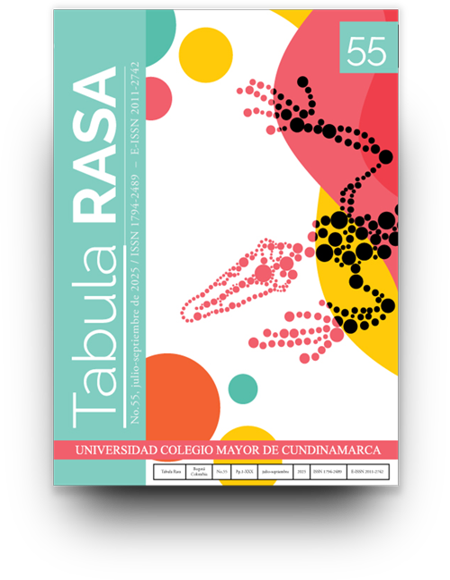Da guerra de Putin à mudança climática: reimaginando o conceito de lebensraum

Este trabalho encontra-se publicado com a Licença Internacional Creative Commons Atribuição-NãoComercial-SemDerivações 4.0.
Mostrar biografia dos autores
Na década de 2020 apresentou-se uma série de conflitos bélicos que desestabilizaram regiões completas, representando um desafio extraordinário para a ordem internacional. Entre os conflitos mais destacados está a invasão russa da Ucrânia em 2022 e a guerra do atual Governo israelense contra a organização militante palestina Hamas em Gaza. Neste artigo analiso essa classe de conflitos desde uma perspectiva da geografia política, fazendo referência particular ao conceito lebensraum, ou “espaço vital”. Mostrarei como esse conceito, elaborado pelo geógrafo alemão Friedrich Ratzel no século XIX, oferece hoje um quadro explicativo importante para compreender melhor o imperativo territorial que conforma a lógica beligerante nessa classe de conflitos. Contudo, examinarei sob esse prisma não apenas a invasão russa e a guerra de Putin contra Ucrânia, mas também contextos de resistência, como o caso do projeto territorial do movimento guerrilheiro das Forças Armadas Revolucionárias da Colômbia (Farc) – sugerindo que é possível considerá-lo uma tentativa na construção de um “lebensraum revolucionário” – e, em menor medida, uma tentativa do movimento jihadista do Estado Islâmico Isis de criar um califado islâmico ou um “lebensraum do califado ou jihadista” nos territórios de Iraque e Síria na metade da década de 2010. Daí, proponho uma reimaginação do conceito de lebensraum para uma leitura e aplicação mais pacífica, tirando-o de seu contexto usual de conflito e guerra. Faço isso por meio de uma leitura biogeográfica estendendo-a para a crise climática global contemporânea como um desafio para a humanidade inteira, uma luta global por nosso lebensraum comum.
Visualizações de artigos 27 | Visitas em PDF 6
Downloads
- Abrahamsson, C. (2013). On the genealogy of Lebensraum. Geographica Helvetica, 68(1), 37-44. https://doi.org/10.5194/gh-68-37-2013
- Agnew, J. (2023). Vladimir Putin’s territorial trap: what the invasion of Ukraine reveals about the contemporary war-sovereignty nexus. En G. Daho & Y. Richard (eds.). War, state and sovereignty (pp. 43-70). Palgrave Macmillan.
- Agnew, J. & Corbridge, S. (Eds.). (1995). Mastering space: hegemony, territory and international political economy. Routledge.
- Agnew, J. & Oslender, U. (2010). Territorialidades superpuestas, soberanía en disputa: lecciones empíricas desde América Latina. Tabula Rasa, 13, 191-213. https://doi.org/10.25058/20112742.409
- Arendt, H. (1977 [1963]). Eichmann in Jerusalem: a report on the banality of evil. Penguin Books.
- Bassin, M. (1987). Imperialism and the nation state in Friedrich Ratzel’s political geography. Progress in Human Geography 11(4), 473-495. https://doi.org/10.1177/030913258701100401
- Bowman, I. (1942). Geography vs. Geopolitics. Geographical Review, 32(4), 646-658. https://doi.org/10.2307/210002
- Dahlman, C. (2009). Geopolitics. En C. Gallaher, C. Dahlman, M. Gilmartin, A. Mountz & P. Shirlow (eds.). Key concepts in Political Geography (pp.77-85). Sage.
- Echandía, C. (1999). Geografía del conflicto armado y las manifestaciones de la violencia en Colombia. Oficina de la Vice-Presidencia.
- Escobar, A. (2017). Designs for the pluriverse: radical interdependence, autonomy, and the making of worlds. Duke University Press.
- Escobar, A. (2020). Pluriversal politics: the real and the possible. Duke University Press.
- Foucault, M. (1997). Society must be defended: lectures at the Collège de France, 1975-1976. St. Martin’s Press.
- Harvey, D. (2000). Spaces of hope. University of California Press.
- Herwig, H. (2016). The demon of geopolitics: how Karl Haushofer “educated” Hitler and Hess. Rowman & Littlefield.
- Hill, F. & Stent, A. (2022). The world Putin wants. How Distortions About the Past Feed Delusions About the Future. Foreign Affairs (September/October), https://www.foreignaffairs.com/russian-federation/world-putin-wants-fiona-hill-angela-stent
- Kropotkin, P. (1902). Mutual aid: a factor of evolution. McClure Phillips & Co.
- Lefebvre, H. (1976 [1970]). Reflections on the politics of space. Antipode, 8(2), 30-37. https://doi.org/10.1111/j.1467-8330.1976.tb00636.x
- Lemke, T. (2011). Biopolitics: an advanced introduction. NYU Press.
- Mackinder, H. J. (1904). The geographical pivot of history. The Geographical Journal, 23(4), 421-437. https://doi.org/10.2307/1775498
- McColl, R. W. (1969). The insurgent state: territorial bases of revolution. Annals of the Association of American Geographers, 59(4), 613-631. https://www.jstor.org/stable/2561830
- Monroe-Hamilton, T. (Feb 27, 2014). Putin adopts a Russian Lebensraum policy. NoisyRoom.net, http://noisyroom.net/blog/2014/02/27/putin-adopts-a-russian-lebensraum-policy/
- Oslender, U. (2004). Construyendo contrapoderes a las nuevas guerras geo-económicas: caminos hacia una globalización de la resistencia. Tabula Rasa, 2, 59-78. https://doi.org/10.25058/20112742.207
- Oslender, U. (2010). La búsqueda de un contra-espacio: ¿hacia territorialidades alternativas o co-optación por el poder dominante? Geopolítica(s): Revista de Estudios sobre Espacio y Poder 1(1), 95-114. https://revistas.ucm.es/index.php/GEOP/article/view/GEOP1010120095A
- Oslender, U. (2018). Terror y geografía: examinar múltiples espacialidades en un mundo aterrorizado. Clepsidra: Revista Interdisciplinaria de Estudios sobre Memoria, 5(9), 68-85. https://revistas.ides.org.ar/clepsidra/article/view/364
- Oslender, U. (2019). Geographies of the pluriverse: decolonial thinking and ontological conflict on Colombia’s Pacific Coast. Annals of the American Association of Geographers, 109(6), 1691-1705. https://doi.org/10.1080/24694452.2019.1572491
- Pécaut, D. (2001). Guerra contra la sociedad. Planeta.
- Pinochet, A. (1974). Geopolítica. Editorial Andrés Bello.
- Reiter, B. (Ed.). (2018). Constructing the pluriverse: the geopolitics of knowledge. Duke University Press.
- Richani, N. (2002). Systems of violence: the political economy of war and peace in Colombia, State University of New York Press.
- Said, E. (1983). The world, the text, and the critic. Harvard University Press.
- Sarid, Y. (Aug 26, 2011). Lebensraum as a justification for Israeli settlements. Haaretz. https://www.haaretz.com/lebensraum-as-a-justification-for-israeli-settlements-1.380787
- Slater, D. (1986). Socialism, democracy and the territorial imperative: elements for a comparison of the Cuban and Nicaraguan experiences. Antipode, 18(2), 155-185. https://doi.org/10.1111/j.1467-8330.1986.tb00361.x
- Smith, N. (2003). American Empire: Roosevelt’s geographer and the prelude to globalization, University of California Press.
- The New York Times (March 14, 1946). Haushofer, Hitler’s ‘geopolitician’, commits suicide with his wife. p. 3. https://www.nytimes.com/1946/03/14/archives/haushofer-hitlers-geopolitician-commits-suicide-with-his-wife.html
- Visvanathan, S. (1991). Mrs. Brundtland’s disenchanted cosmos. Alternatives, 16(3), 377-384.
- WCED (World Commission on Environment and Development) (1987). Our common future. Oxford University Press.
- Weizman, E. (2007). Hollow land: Israel’s architecture of occupation. Verso.
- Zibechi, R. (2008). Territorios en resistencia: cartografía política de las periferias urbanas latinoamericanas. Lavaca.








